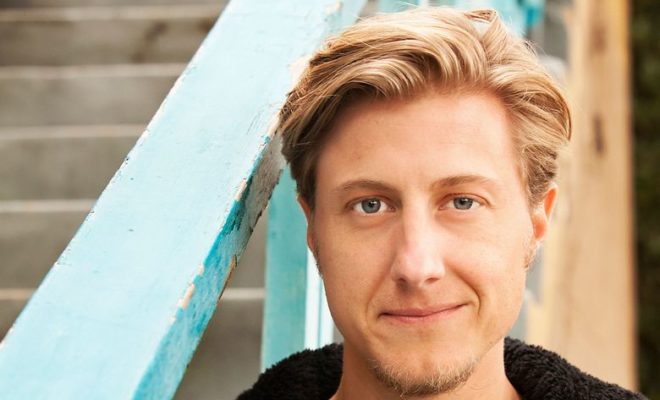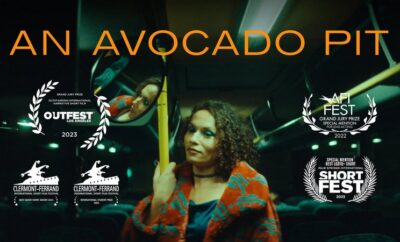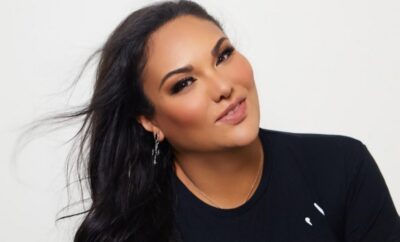 Olivia Hemaratanatorn
Olivia Hemaratanatorn
Interviews
Scott Turner Schofield – Becoming a Man in 127 EASY Steps
By: Paige Zinaman
Q) What are some of the projects that you’ve got coming up?
A) I’ve been working on a one man show special called Becoming a Man in 127 EASY Steps, which we are close to finishing. It started as a live show that I toured around the US and Europe for a long time, long before the interest in transgender stories was what it is now. As trans stories grow more popular, it’s only becoming more relevant!
The work contains 127 different short pieces and in the live show audiences would call out numbers between 1-127, making a different experience every time. We translated that for screens so we could reach a much bigger audience. We have a feature film that is a kind of “best of” compilation of sixteen of the steps. The rest of the pieces are done in short videos, podcast episodes and short stories—and again, audiences pick their own path through the media, interactively creating their own experience of my journey to becoming a man.
When the pandemic shut down in-person film festivals, we used it as an opportunity to try out how this idea would really work. Outfest in LA gave us the opportunity and it was a wild success. So, I’m looking forward to releasing the work this year on a large scale, just when audiences need it.
I’m also excited for the premiere of “Equal” on HBO Max coming in October. I got to play Craig Rodwell, one of the activists who initiated the Pride parades we enjoy today. It was an honor to play this real life figure whose life and work have so profoundly impacted my own; and it marks my first non-transgender acting role.
Q) I’d like to say Congratulations on your Emmy nomination! Your work on “Studio City” is ground breaking for many reasons, what is it about “Studio City” do you feel makes it so unique?
A) Thank you! I was so honored to be recognized for that role.
Sean and Michele Kanan, who created and wrote the show, really paid attention to making sure a very truthful story got told, when it came to the trans aspect of the work. I was given the space to bring all of myself to the role and really do it right. I guess we did!
I think it’s proof that when creators tell transgender stories that actually include transgender people from script to screen, they just come out so much better—Emmy worthy, even!
Q) You’re making history by being the first trans actor to be nominated for an Emmy. How does that feel and what do you hope will be the message?
A) What feels amazing is being recognized by my peers as having done good work. The fact that people would vote for an out trans actor doing a trans-focused role shows a change in how inclusive of diversity we are becoming as an industry. I hope that’s the message: that there are so many storytellers whose authentic voices deserve a platform—and that there are great rewards to be had when that happens.
Q) You also have an Instagram interview series out now where you interview fellow actors and trans men to increase visibility. Please talk to us a little about how this came along and what you hope others will take from this series.
A) When I got nominated, I knew it was bigger than just me. The fact that I am the first transgender man nominated for an acting Emmy really highlights how invisible my community is in Hollywood. So, I committed to use the visibility I suddenly had to raise awareness about the other trans masculine professionals, folks like myself, working all around Hollywood. If people witness us telling our own stories, we’re closer to getting our stories told in a bigger way. So, I reached out to folks in all facets of production, to give a sense of how very much we’re here, just waiting to be discovered and to represent the diversity of experience—and expertise—we have to offer.
Q) As a trans actor, what have been some of your experiences while going in for an audition?
A) I think it’s one thing to go for a role where a casting director is watching you critically for whether you can play, say a doctor, convincingly. That’s a tension that is universal among actors. You do your best and if you get the role, you know it was because you brought something that was going to support the whole production. If you don’t get it, it’s not personal, really—they were just looking for something you don’t bring. That’s a scrutiny and a rejection I signed up for in becoming a professional actor.
But it is a whole different thing when a casting director is looking at you to judge whether you fit their expectations of what a man “really” looks like—before your acting skill is even considered. What does that even mean, to “look like a man?” And, in the Year of Our Lord 2020, why can’t a doctor—or a barista or a best friend—be a trans person without the script having to focus on that? Why couldn’t any one of those characters just clearly have an interesting backstory, but not have to reveal it? But I digress…
Those are the harder auditions—where I know I am going up against someone’s personal biases as to whether I fit “their” definition of what a particular kind of human looks like—starting with that they don’t know if they think I can pull this “man” thing off. In those auditions, I know I’m not being looked at equally to the other actors, for my professional skills and what I can bring to a production.
But this is no different than the employment discrimination that all transgender people face—it’s just harder to call out because casting is so subjective. For a long time I would blame myself, doubt my skill. Now, I can feel pretty instantly whether I’m being considered as a professional actor, or solely along the lines of my gender expression.
In those auditions where I’m vibing with the professionals in the room on an artistic level—where I know they see my training, and also the heart and soul I’m giving to the role—these are the projects I want to be cast in, anyway! They’re going to be the better stories. So, I’ve been able to stop taking the judgmental auditions much less personally, and see them as a bullet I’ve dodged, while the artistry-based auditions are proof of a world changing for the better.
Q) With some of the trans news that’s been online recently, have you seen a difference in Hollywood?
A) I am definitely seeing Hollywood pay real attention to the community and our issues, now that these topics have had real visibility in the news and in culture. I’m grateful that we seem to be moving firmly into a place where there are good roles for trans people and great trans actors finally being seen and given a platform to shine. The conversation about “why” we should cast trans actors seems to be going retrograde now, thankfully, and the question is finally becoming “how can we tell the best stories, and who are the most talented actors to fill the roles.” That is what we wanted.
Q) Representation is such an important thing to have in television series and movies, so as we move forward what would you like to see from more movies and series?
A) I have had to bang the drum of trans inclusion, specifically, for so long because it is an issue that directly affects my livelihood. But I have always been “all for one and one for all” on the issue of diversity in representation and I am delighted by the push for greater and deeper diversity at all levels of tv and film—because it makes better stories! Certainly, I love the truly amazing epics centering straight white men, like “Better Call Saul” – but it’s series like “Insecure,” “Vida,” “Pose,” “Ramy,” “Work in Progress” (and more) that are filling out the whole human story, bringing in new and exciting stories and artists and making the TV renaissance we are all enjoying so much. I want to keep seeing stories that more of us can see ourselves in, I want to keep enjoying stories that show me more of the people I share the planet with.
Q) What are some words of encouragement you could give to trans youth who are in the process of finding their authentic selves?
A) We need you. Don’t stop being who you are, don’t stop demanding your human rights—this is how amazing stories happen, which we can turn into inspiring stories for others and helps change the world. I know this is true because I have seen it happen in my own life—whether through my story or in the stories of other trans and non-binary people out there. You being true to yourself profoundly changes the world around you in positive ways. We need that—we need you—so badly right now.
Q) Fans, like myself, often wonder what we could do better to show support; what could we do to educate ourselves more on such important issues such as trans equality?
A) There is so much information and so many stories out there, all it takes is a commitment to listening, accepting and learning—and a deep dive on google to find out what’s important to us and what exactly we need, more generally.
But since you asked me—and thank you for that—I’m going to ask you for my personal desire, which is to show up. If you want more trans stories, you have to click them, watch them, read them, share them on social media: you have to be willing to support trans stories by showing up for them, as well as just wanting them to exist.
Similarly, if you want equality, you have to be willing to show up for it in your life – not just with or for us. When someone misgenders another person, even if they’re not in the room, correct that person; if someone is spreading misinformation or even hate, use your influence among your peers and be the change you want to see by speaking up against it. It can’t just be trans people advocating for ourselves—we need you to show up for the change that needs to happen. Being in support of trans equality is not an adjective you use to describe yourself—it’s a verb, it’s action you take and we badly need you!
I am so grateful that so many people want trans equality, from their screens to their streets. Now, we need you to do the work.
Q) What would you like to say everyone who are fans and supporters of you?
A) I really just can’t say thank you enough. When I succeed, it is a collective effort and a group success. There simply is no me without you: I could not be a success without a whole world of people who created the conditions for that to happen. Creating a world in which I can succeed does that for many more people than me. So, let’s keep doing it! And thank you again.





You must be logged in to post a comment Login